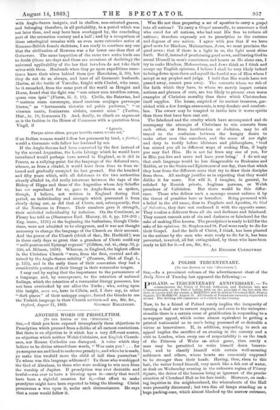ANOTHER WORD ON PROSELYTISM.
[TO THE EDITOR OF THE "SPECTATOR.")
think you have exposed triumphantly those objections to Proselytism which proceed from a dislike of all earnest convictions. But there is an objection to it which has a very different source, an objection which neither Welsh Calvinists, nor English Church- men, nor Roman Catholics can disregard. A voice which they believe to be divine uttered these words, " Woe unto you! . . . for ye compass sea and land to make one proselyte, and when he is made, ye make him twofold more the child of hell than yourselves." To whom was this language addressed? To those who worshipped the God of Abraham, to those who were seeking to win men from the worship of Jupiter. If proselytism was ever desirable and lawful—was ever to have a blessing upon it—surely that would have been a rightful occasion for it,—that effort to make proselytes might have been expected to bring the blessing. Christ pronounces a woe upon it, under such circumstances. He says that a curse would follow it. Was He not then preparing a set of apostles to carry a gospel into all nations? To carry a Gospel assuredly, to announce a God who cared for all nations, who bad sent His Son to redeem all nations ; therefore expressly not to proselytize to the customs and dogmas of one nation. I agree with you that if we have good news for Hindoos, Mahometaus, Jews, we must proclaim the good news ; that if there is a light in us, the light must shine forth. But if, instead of proclaiming good news, and leaving God to reveal Himself in men's consciences and hearts as He alone can, I try to make Hindoos, Mahotnetans, and Jews think as I think and accept my English opinions, I believe I shall be very likely indeed to bring down upon them and myself the fearful woe of Him whom I accept as my prophet and judge. I hold that His words have not passed away, cannot pass away. The converts whom we rob of the faith which they have, to whom we merely impart certain notions and phrases of ours, are too likely to present even worse examples of Christian morality than those which Christendom itself supplies. The house, emptied of its ancient treasures, gar- nished with a few foreign ornaments, is very desolate and comfort- less. The owner may be tempted to invite into it worse spirits than those that have been cast out.
The falsehood and the cruelty which have accompanied and do accompany the attempts of Christians to win converts from each other, or from heathendom or Judaism, may be all traced to the confusion between the hungry desire to make other men like ourselves, and the sense of our right and duty to testify before idolators and philosophers, God has stirred you all to different ways of seeking Him, if haply you may find Him. Ho is not far from any one of you, for in Him you live and move and have your being.' I do not say that such language would be less disagreeable to Brahmins and Rabbis, or to the Stoics and Epicureans of our day, than that which they hear from the different sects that try to draw their disciples from them. All analogy justifies us in expecting that they would dislike it far more. Nor will it, I imagine, in general, be relished by Romish priests, Anglican parsons, or Welsh preachers of Calvinism. But there would be this differ- ence. Those who deliver such a message cannot enforce it by the threat of penalties here or hereafter. Being possessed with a belief in the old name, dear to Prophets and Apostles, the God of Salvation, they dare not confound it with the opposite name. They confess a deliverer from all sin and darkness and falsehood. They cannot commit acts of sin and darkness or falsehood for the sake of making Him known. The proselytizer is ready to kill for the sake of his opinions. St. Stephen and St. Paul were ready to die for their Gospel. And the faith of Christ, I think, has been planted in the nations by the men who were ready to die for it, has been perverted, inverted, all but extinguished, by those who have been ready to kill for it.—I am, Sir, &c., AN ENGLISH CLERGYMAN






























 Previous page
Previous page